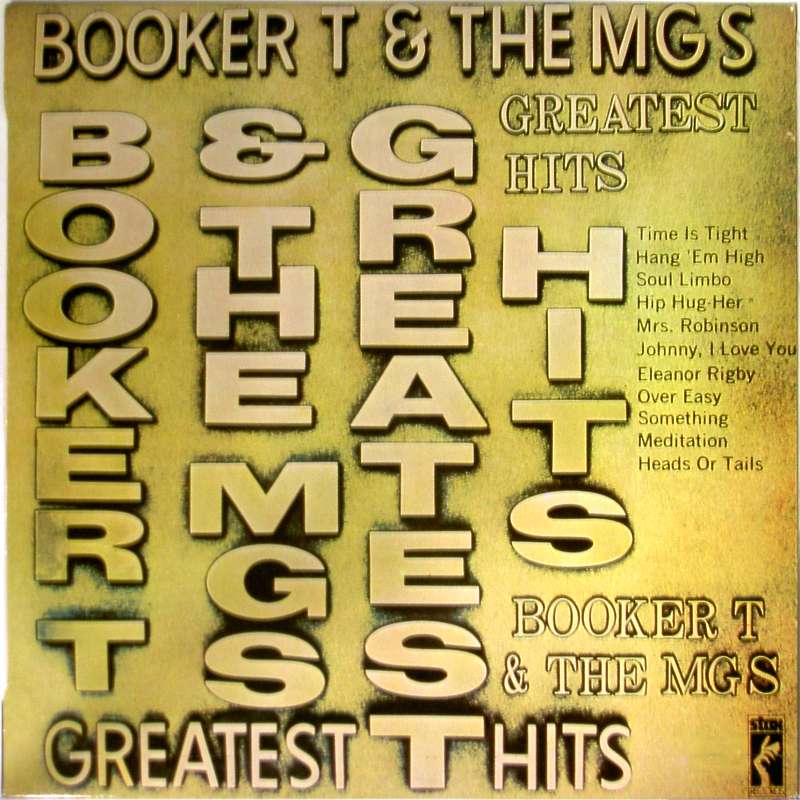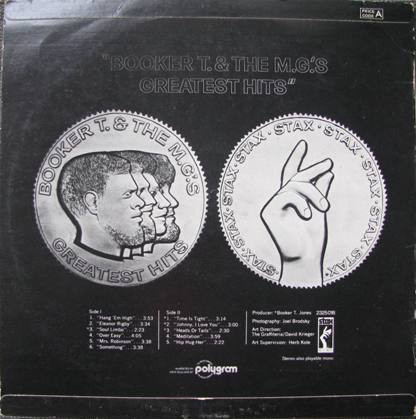

| Product Code: | 2325018 |
| Artist: | Booker T. & The M.G.s |
| Origin: | New Zealand |
| Label: | Stax |
| Format: | LP |
| Availability: | Enquire Now |
| Condition: |
Cover: NM (M-)
Record: NM (M-)
|
| Genre: | Pop U |
Stunning vinyl, flipback cover in excellent condition. A great copy.
Booker T. & the M.G.'s were an American instrumental R&B/funk band that was influential in shaping the sound of Southern soul and Memphis soul. The original members of the group were Booker T. Jones (organ, piano), Steve Cropper (guitar), Lewie Steinberg (bass), and Al Jackson Jr. (drums). In the 1960s, as members of the house band of Stax Records, they played on hundreds of recordings by artists including Wilson Pickett, Otis Redding, Bill Withers, Sam & Dave, Carla Thomas, Rufus Thomas, Johnnie Taylor and Albert King. They also released instrumental records under their own name, including the 1962 hit single "Green Onions". As originators of the unique Stax sound, the group was one of the most prolific, respected, and imitated of its era. By the mid-1960s, bands on both sides of the Atlantic were trying to sound like Booker T. & the M.G.'s.[1][2]
In 1965, Steinberg was replaced by Donald "Duck" Dunn, who played with the group until his death in 2012. Al Jackson Jr. was murdered in 1975, after which Dunn, Cropper and Jones reunited on numerous occasions using various drummers, including Willie Hall, Anton Fig, Steve Jordan and Steve Potts.[1]
The band was inducted into the Rock and Roll Hall of Fame in 1992, the Musicians Hall of Fame and Museum in Nashville, Tennessee in 2008, the Memphis Music Hall of Fame in 2012, and the Blues Hall of Fame in 2019.[3]
Having two white members (initially Cropper and Steinberg, later Cropper and Dunn) and two black members (Jones and Jackson Jr.), Booker T. & the M.G.'s was one of the first racially integrated rock groups,[4] at a time when soul music and the Memphis music scene, in particular, were generally considered the preserve of black culture.[5]
Booker T. & the M.G.'s formed as the house band of Stax Records, providing backing music for numerous singers, including Wilson Pickett and Otis Redding.[6] In summer 1962, 17-year-old keyboardist Booker T. Jones, 20-year-old guitarist Steve Cropper, and two seasoned players, bassist Lewie Steinberg and drummer Al Jackson Jr. (the latter making his debut with the company) were in the Memphis studio to back the former Sun Records star Billy Lee Riley. During downtime, the four started playing around with a bluesy organ riff. Jim Stewart, the president of Stax Records, was in the control booth. He liked what he heard, and he recorded it. Cropper remembered a riff that Jones had come up with weeks earlier, and before long they had a second track.[7]
Stewart wanted to release the single with the first track, "Behave Yourself", as the A-side and the second track as the B-side. Cropper and radio disc jockeys thought otherwise; soon, Stax released Booker T. & the M.G.'s' "Green Onions"[6] backed with "Behave Yourself". In conversation with BBC Radio 2's Johnnie Walker, on his show broadcast on September 7, 2008, Cropper recalled that the record became an instant success when DJ Reuben Washington, at Memphis radio station WLOK, played it four times in succession, before the track or even the band had a name. For the rest of the day, people were calling in to the station, asking if the record was out yet.
The single went to number 1 on the US Billboard R&B chart and number 3 on the pop chart. It sold over one million copies and was certified a gold disc.[8] It has been used in numerous movies and trailers, including a pivotal scene in the motion picture American Graffiti.
Later in 1962, the band released an all-instrumental album, Green Onions. Aside from the title track, a "sequel" ("Mo' Onions") and "Behave Yourself", the album consisted of instrumental covers of popular hits.
Booker T. & the M.G.'s continued to issue instrumental singles and albums throughout the 1960s. The group was a successful recording combo in its own right, but most of the work by the musicians in the band during this period was as the core of the de facto house band at Stax Records.[7] Members of Booker T. & the M.G.'s (often, but not always, performing as a unit) performed as the studio backing band for Otis Redding, Sam & Dave, Albert King, Johnnie Taylor, Eddie Floyd, the Staple Singers, Wilson Pickett, Delaney & Bonnie and many others in the 1960s.[7]
They played on hundreds of records, including classics like "Walking the Dog", "Hold On, I'm Comin'" (on which the multi-instrumentalist Jones played tuba over Donald "Duck" Dunn's bass line[citation needed]), "Soul Man", "Who's Making Love", "I've Been Loving You Too Long (To Stop Now)", and "Try a Little Tenderness", among others.[7] Along with their counterparts in Detroit, Motown's Funk Brothers, as a backing band to numerous hits, they are considered to have originated much of the sound of soul music—particularly, in the case of the M.G.'s, Southern soul—in which "the groove" is paramount.
In the mid-1960s, Jones was often away from Memphis while studying music full-time at Indiana University.[7] Stax writer and producer Isaac Hayes usually stepped in when Jones was unavailable for session work, and on several sessions Jones and Hayes played together with one on organ, the other on piano. However, Hayes was never a regular member of the M.G.'s, and Jones played on all the records credited to Booker T. & the M.G.'s, with one exception: the 1965 hit "Boot-Leg", a studio jam with Hayes playing keyboards in Jones's place. According to Cropper, it had been recorded with the intention of releasing it under the name of the Mar-Keys (the name had sometimes been used on singles by the Stax house band). However, as recordings credited to Booker T. & the M.G.'s were meeting with greater commercial success than those credited to the Mar-Keys, the decision was made to credit "Boot-Leg" to Booker T. & the M.G.'s, even though Jones did not participate in the recording.
Individual session credits notwithstanding, the Stax house band—Cropper, Jackson, Jones, and Steinberg, along with bassist Dunn (Cropper's bandmate in the Mar-Keys); keyboardist Isaac Hayes; and various horn players, most frequently Floyd Newman, Wayne Jackson and Andrew Love (the latter two later formed the Memphis Horns)—set a standard for soul music. Whereas the sign outside Detroit's pop-oriented Motown Records read "Hitsville U.S.A.", the marquee outside of the converted movie theater where Stax was based proclaimed "Soulsville U.S.A."